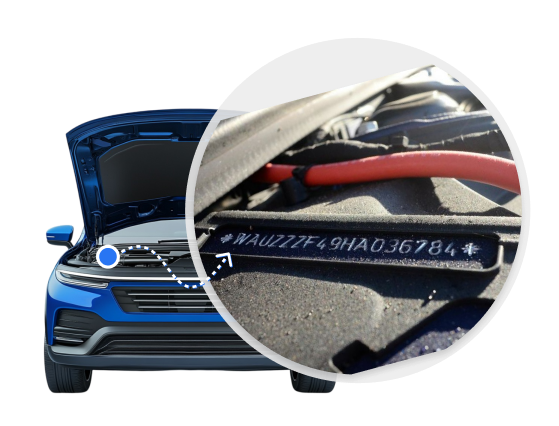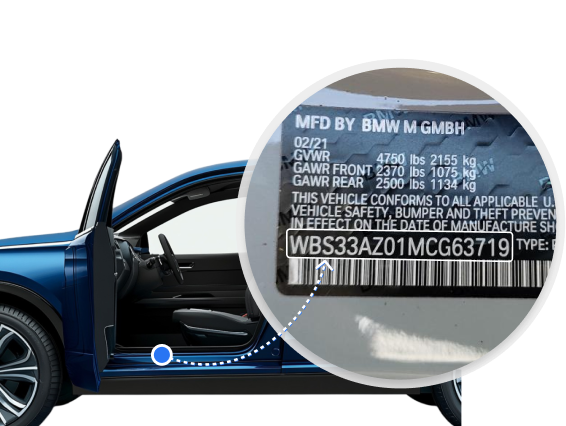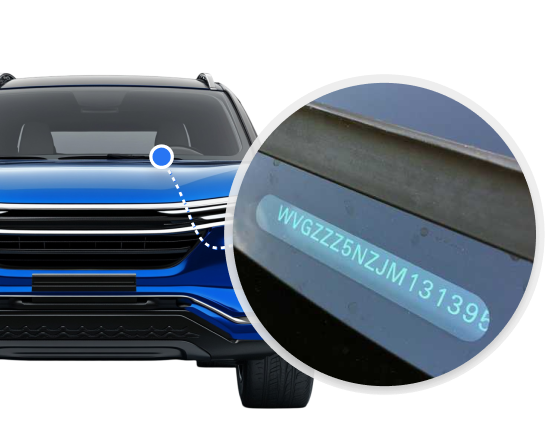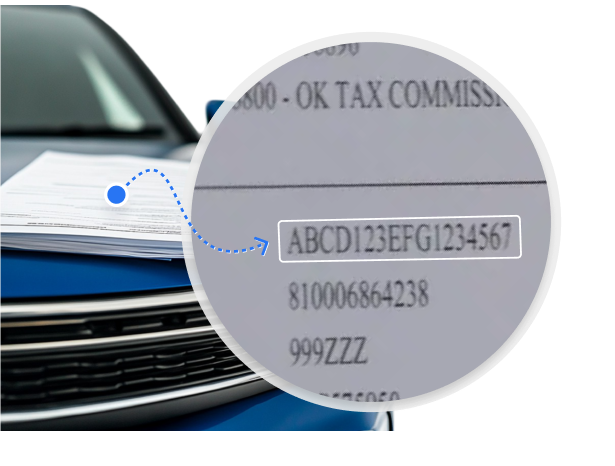Is It Safe to Share Your VIN Number? Expert Advice & Tips
When I'm selling or buying a car, can you trust someone with my vehicle identification number (VIN)? When dealing with repairs, insurance, or transactions involving a vehicle, the Vehicle Identification Number (VIN) is essential. Gaining a clear understanding of its function and knowing when to share it can enhance your security and make vehicle-related chores easier. Learn more about vehicle identification numbers (VINs), their applications, the risks of sharing them, and how to rest easy in this article.

What is a VIN? What Can You Do With a Vehicle Identification Number?
VIN is Used for Sales
Using the vehicle identification number (VIN), consumers can verify the vehicle's legitimacy, trace its past, and rule out serious accidents or theft. Buyers and sellers can develop trust when this figure is shared transparently. Another perk is that customers may see whether there have been any product recalls that could affect their safety or performance.
VIN is Used for Services
Automobile technicians rely on the vehicle identification number (VIN) to identify precise maintenance needs. It makes sure everything works together and makes repairs and maintenance easier. Also, the vehicle identification number (VIN) is associated with service records, which provide a comprehensive record of repairs and replacements. This helps with regular maintenance and avoids expensive mistakes.
VIN is Used for Insurance
The vehicle identification number (VIN) is used by insurance firms to determine insurance rates, confirm ownership, and evaluate the vehicle's history. By comparing claims with past data, insurers may check if vehicles have adequate coverage and identify instances of possible fraud.
Is It Safe to Share Your VIN Number?
Concerned that it might be used fraudulently or inappropriately, many people are hesitant to share their VIN number. Let’s address some of these concerns:
Are VIN Numbers Public Information?
Yes, VIN numbers are considered public information. They can usually be seen via the windshield or the frame of the driver's side door on the majority of vehicles. Law enforcement, mechanics, and buyers will be able to swiftly identify and verify a car with this visibility. The degree of security you experience depends on when and how you share the number, even though the number itself is public.
Should a VIN Number Be Private?
While VIN numbers are public, they do contain critical details about a car. The owner's identity remains concealed, though. Although it is usually not required to keep your VIN secret, there are several situations in which you should be careful (such as when posting information online without context). When coupled with other information about the vehicle or owner, fraudsters could use the VIN to fabricate paperwork.
What Can You Look Up With a VIN Number?
When you look up a vehicle's history with its VIN, you can find out things like:
- Accident records
- Recall notices
- Registration details
- Stolen vehicle status
- Ownership changes
- Detailed specifications, such as engine type and features
Unless paired with other sensitive information, these insights are useful for purchasers but pose no threat to the owner. Customers benefit from being able to make educated purchases, and vendors can boost their reputation by being open and honest.
Who Has Access to Vehicle Identification Numbers (VIN)?
There are a few groups who frequently use VINs for legal reasons:
Vehicle Owners
When it comes to registration, insurance, and upkeep, owners can't do without the VIN. It's mandatory for all formal paperwork pertaining to the vehicle. Having this data on hand makes administrative tasks and service scheduling go more smoothly.
Potential Buyers
People who are looking to buy a car usually want to know its VIN so they can look it up on sites like Carinfos. This fosters an environment of openness and confidence. Giving a potential buyer the vehicle's VIN gives them peace of mind about the vehicle's history and condition.
Insurance Companies
During the policy-setting procedure, insurance carriers utilize the VIN to confirm vehicle details and compute premiums. Accurate policy underwriting and claims processing are made possible by this data, which helps to reduce disputes and errors.
Mechanics and Maintenance Facilities
In order to get the correct components, view service bulletins, and do repairs correctly, mechanics need the VIN. This is of the utmost importance when it comes to cars that have unusual specs or are uncommon models.
Online VIN Decoders
To get more information about a vehicle, you can use online programs that decode VINs. Buyers and sellers can use these services to confirm basic information without sacrificing security. Comprehensive reports are offered by platforms such as Carinfos, which enhance the value of car sales.
Knowing When It's Safe to Share Your VIN Number
You may stay safe and have seamless transactions if you know when and how to reveal your VIN.
Should I Provide a VIN Number When Selling a Car?
Yes, it is common practice to provide a vehicle's VIN to prospective purchasers. As a result, they can:
- Verify the car’s history
- Check for recalls
- Ensure the title is clean
Having said that, only disclose your VIN with serious buyers or trustworthy platforms. The sales procedure can be accelerated and your reputation enhanced by including your VIN with a dependable history record.
Sharing a VIN with Mechanics or Insurers
Repair shops, insurance companies, and other experts will always ask for your VIN. Repairs and insurance quotations must be precise, thus it is essential. In addition, minimizing delays caused by erroneous details and ensuring smoother service delivery are both achieved by keeping these personnel informed.
Avoid Publicly Posting Your VIN
Although it's usually safe to share your VIN privately, you should stay away from public forums or unverified sites when posting it. Title cloning or illegal sale listings are less likely to occur as a result of this. Restricting access to trusted individuals is a prudent measure to take because fraudsters can try to abuse publicly shared VINs.
Risks of Sharing Your VIN Number
In most cases, sharing your VIN is completely secure, but there are still some things to watch out for. If you are aware of these dangers, you can better safeguard yourself and your car.
VIN Cloning
Criminals engage in vehicle identification number (VIN) cloning when they transfer a valid VIN from one vehicle to another, usually a stolen one. The criminals can then sell or register the stolen vehicle under the false impression that it is legitimate thanks to the cloned VIN. For instance, according to recent reports from the automobile industry, one motorist lost $40,000 after buying a car with a cloned VIN. Use reputable history report services, such as Carinfos, and check that VINs match across documents to be safe.
Identity Theft
No personally identifiable information is contained in the VIN on its own, but when combined with additional data, it can result in identity theft. Forged documents or unauthorized access to services could be the result of fraudsters using your VIN in conjunction with publicly disclosed personal information.
Fraudulent Listings
It is possible for criminals to make false online car sale listings by using publicly available VINs. Unwary customers may end up putting down money for cars that either don't exist or are registered to someone else. To stay out of trouble, be careful about sharing your VIN.
Protecting Yourself from Risks
In order to lessen the impact of these dangers:
- Use trusted platforms for VIN verification.
- Avoid sharing your VIN publicly online.
- Cross-check VINs on documents and the vehicle itself.
- Regularly monitor your vehicle’s history for unauthorized changes.
Additional FAQs About VIN Safety
1. Are VIN numbers public record?
Yes, you can find vehicle identification numbers (VINs) in public records, such as vehicle registration documents and even on the automobile itself. Nonetheless, no identifiable information about the owner is disclosed.
2. Is the VIN check legit?
Yes, legitimate VIN check services, such as Carinfos, do exist, and they provide extensive details on a vehicle's past. Prevent scams by only using reputable services.
3. Is it safe to send a VIN number?
Yes, it is safe to send a vehicle identification number to legitimate parties, such as insurance companies, prospective buyers, or technicians. Refrain from posting it on open platforms.
4. Is it safe to post your VIN online?
No, never make your vehicle identification number (VIN) available to the public online. Possibilities such as VIN cloning or false listings may come to light as a result of this.
5. Should I list VIN when selling a car?
Yes, the VIN can be safely shared in a controlled way (for example, through trusted platforms) which boosts buyer confidence and shortens the sales cycle.





